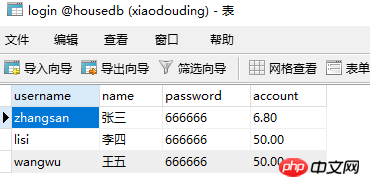Home >Web Front-end >JS Tutorial >Detailed graphic and text explanation of ajax implementation of login function
Detailed graphic and text explanation of ajax implementation of login function
- php中世界最好的语言Original
- 2018-04-02 11:56:022369browse
This time I will bring you a detailed picture and text explanation of the ajax implementation of the login function. What are the precautions for the ajax implementation of the login function. The following is a practical case, let's take a look.
The full name of AJAX is Asynchronous JavaScript and XML (asynchronous JavaScript and XML).
Advantages of ajax:
1. The biggest point is that the page does not refresh, and the user experience is very good.
2. Use asynchronous mode to communicate with the server, with faster response capability. .
3. Some of the work previously burdened by the server can be transferred to the client, using the idle capacity of the client to process it, reducing the burden on the server and bandwidth, and saving space and broadband rental costs. And to reduce the burden on the server, the principle of ajax is to "fetch data on demand", which can minimize the burden on the server caused by redundant requests and responses.
4. Based on standardized and widely supported technology, there is no need to download plug-ins or small programs.
5. Ajax can make Internet applications smaller, faster, and more friendly.
Here I use ajax to write a simple login page: the first thing used is the database login table,

The following is the code of the login page, first To introduce the jquery package
<head> <meta http-equiv="Content-Type" content="text/html; charset=utf-8" /> <title>无标题文档</title> <script src="jquery-3.1.1.min.js"></script> /*引入jquery包*/ </head> <body> <h2>登录页面</h2> <p>用户名:<input type="text" id="uid"/></p> <p>密码:<input type="text" id="pwd"/></p> <p><input type="button" id="btn"value="登录"/></p>11</body>12</html>
The login page is very simple, so I won’t show the picture above. I have written about it many times in previous blogs
Then the following is how to write ajax
<script type="text/javascript">
$("#btn").click(function(){
//第一步:取数据,这里用到了用户名和密码
var uid=$("#uid").val();
var pwd=$("#pwd").val();
//第二步:验证数据,这里需要从数据库调数据,我们就用到了ajax
$.ajax({
url:"dlchuli.php",//请求地址
data:{uid:uid,pwd:pwd},//提交的数据
type:"POST",//提交的方式
dataType:"TEXT", //返回类型 TEXT字符串 JSON XML
success:function(data){
//开始之前要去空格,用trim()
if(data.trim()=="OK")
{
window.location.href = "main.php";
}
else{
alert("用户名或者密码错误");
}
}
})
})
</script>## The code of #dlchuli.php is written as follows:
<?php
include("DADB.class.php");
$db=new DADB();
$uid=$_POST["uid"];
$pwd=$_POST["pwd"];
$sql="select password from login where username='{$uid}'";
$arr=$db->Query($sql);
if($arr[0][0]=$pwd && !empty($pwd))
{
echo"OK";
}
else{
echo"NO";
}
?> I believe you have mastered the method after reading the case in this article. For more exciting information, please pay attention to other related articles on the php Chinese website! Recommended reading:
How to use ajax to realize pop-up login
The above is the detailed content of Detailed graphic and text explanation of ajax implementation of login function. For more information, please follow other related articles on the PHP Chinese website!
Related articles
See more- An in-depth analysis of the Bootstrap list group component
- Detailed explanation of JavaScript function currying
- Complete example of JS password generation and strength detection (with demo source code download)
- Angularjs integrates WeChat UI (weui)
- How to quickly switch between Traditional Chinese and Simplified Chinese with JavaScript and the trick for websites to support switching between Simplified and Traditional Chinese_javascript skills

